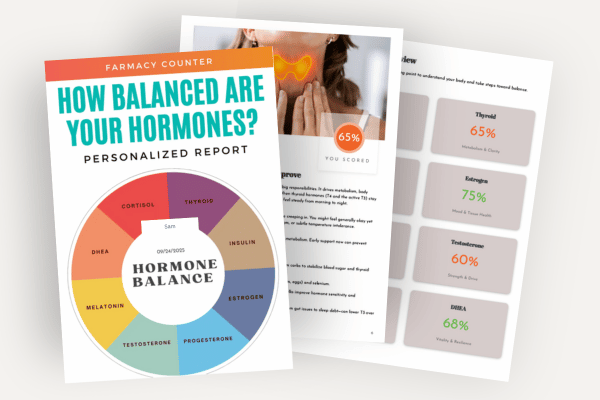
Hormones influence nearly every system in your body — from energy, mood, and metabolism to sleep, immunity, weight, fertility, and mental clarity. When they’re out of balance, you feel it: tired but wired, anxious, inflamed, gaining weight without reason, sleeping poorly, or emotionally flat.
But here’s the truth: hormonal imbalances rarely occur in isolation. They’re often a signal that deeper systems — like your metabolism, detox pathways, gut, stress response, or immune system — need support.
This is where Functional Medicine makes all the difference. We don’t suppress symptoms. We decode your body’s signals, get precise with testing, and guide you through personalized interventions rooted in nutrition, lifestyle, and smart supplementation.
8 Key Hormones That Could Be Driving Your Symptoms
Think of your hormone system like an orchestra. If just one instrument is off-key, the whole symphony suffers. The following eight hormones are foundational — and understanding them might explain symptoms you’ve been told are “normal,” “age-related,” or “in your head.”
Let’s dig in.
1️⃣ Progesterone – The Calming, Cycle-Stabilizing Hormone
What it does:
In women, progesterone is primarily made after ovulation and is essential for a regular cycle, fertility, deep sleep, and emotional balance. It’s your body’s natural anti-anxiety and anti-inflammatory hormone.
But did you know?
Men produce progesterone too. It helps balance excess estrogen and supports mood, brain function, and sleep.
Signs of imbalance:
- Anxiety or mood swings
- Poor sleep or vivid, restless dreams
- PMS, irregular cycles, fertility challenges (in women)
- Estrogen dominance symptoms (men & women)
Functional Medicine Strategy
Testing
- DUTCH Complete hormone panel
- Cycle tracking apps (MIRA) can help identify ovulation and timing for testing
Root Cause Support: A Personalized, Multi-Layered Approach
Depending on your symptoms, hormone patterns, life stage, and lab results, support may include:
Targeted Nutrients & Botanicals
- Vitex (chaste tree berry) – supports luteal phase hormone production and regular ovulation
- Magnesium (especially glycinate or threonate) – calms the nervous system and supports hormone synthesis
- Vitamin B6 – cofactor for progesterone production and mood balance
- Vitamin C + Zinc – antioxidant support for the corpus luteum (the gland that makes progesterone)
Hormone-Nourishing Nutrition
- Blood sugar balance is non-negotiable — insulin spikes can impair ovulation
- Emphasis on healthy fats (avocados, olive oil, wild salmon), protein, and complex carbs
- Avoiding under-eating or overly restrictive dieting (which can halt ovulation completely)
Nervous System & Adrenal Support
- Chronic stress diverts resources toward cortisol and away from progesterone
- Nervous system regulation tools: breathwork, HRV biofeedback, parasympathetic activation
- Adaptogenic herbs (like ashwagandha or rhodiola) may support adrenal resilience, if indicated
Cycle & Ovulation Optimization
- Supporting healthy ovulation is the key to producing sufficient progesterone
- For some, this includes addressing PCOS, hypothalamic amenorrhea, or thyroid dysfunction first
- Strategic exercise (not too much HIIT), proper fuel, and stress reduction are often essential here
Key Insight: Chronic stress, under-eating, or intense exercise can halt ovulation — which shuts down progesterone production completely. If you’re skipping periods, you’re not making progesterone. And that affects everything from anxiety to bone health.

2️⃣ Estrogen – The Growth, Glow, and Resilience Hormone
Estrogen is so much more than a “female sex hormone.” It’s a powerful metabolic, neurological, cardiovascular, and immune modulator. In the right amounts, it helps women feel vibrant, resilient, energized, and emotionally steady.
It supports:
- Cognitive sharpness and memory
- Skin elasticity and hydration
- Bone density
- Cardiovascular protection
- Vaginal and joint lubrication
- Mood and serotonin regulation
In men, estrogen plays a vital role in sperm health, libido, bone integrity, and brain function — but excess can lead to unwanted fat gain, mood changes, or gynecomastia.
The challenge? Estrogen must be in balance — with itself, with progesterone, and with how the body metabolizes it.
Signs of Imbalance
In Women:
Too Much Estrogen (Estrogen Dominance):
- Heavy or painful periods
- Breast tenderness or fibrocystic breasts
- Bloating, irritability, or mood swings
- Endometriosis, fibroids, or PMS
- Weight gain (especially hips, thighs, and belly)
- Migraines
Too Little Estrogen:
- Hot flashes or night sweats
- Vaginal dryness or painful sex
- Depression or brain fog
- Low libido
- Accelerated skin aging
- Osteopenia or bone loss
In Men:
- Low libido or erectile dysfunction
- Increased belly fat or soft tissue gain
- Breast tissue development
- Emotional changes (irritability, mood swings)
Functional Medicine Strategy
Testing
- DUTCH Complete: Provides a full map of estrogen levels and metabolites (2-OH, 4-OH, 16-OH pathways)
- Serum Estradiol + Estrone, SHBG, and Progesterone (for ratio insights)
- Assess detox pathways, gut function, and inflammation markers as estrogen metabolism is dependent on liver + microbiome health
Personalized Support: Estrogen Balance Is a Whole-Body Process
Metabolism & Detox Pathway Support
- DIM (Diindolylmethane) – helps favor the protective 2-OH estrogen pathway
- Calcium D-Glucarate – supports healthy Phase II detox and reduces estrogen reabsorption in the gut
- Broccoli seed extract / sulforaphane – enhances Phase I liver detox
- B-complex, magnesium, NAC, glutathione – critical for methylation and liver function
Gut + Estrobolome Support
- The estrobolome (a subset of your gut microbiome) determines how estrogen is processed and excreted
- Dysbiosis can lead to beta-glucuronidase activity → reabsorbing estrogen that should be eliminated
- We use probiotics, fiber, polyphenols, and, if needed, gut-healing protocols to restore proper estrogen clearance
Nutrition Strategies
- High-fiber, cruciferous vegetable-rich diets (broccoli, kale, arugula, cauliflower)
- Flaxseeds (contain lignans that support estrogen balance)
- Limiting alcohol (which impairs estrogen detox)
- Identifying and removing dietary endocrine disruptors (processed foods, pesticides)
Xenoestrogen Reduction
- Avoid plastics (especially with heat exposure), conventional beauty products, receipts (BPA), and synthetic fragrances
- We guide you through hormone-safe swaps for household and personal care products
Hormone-Balancing Lifestyle
- Regular bowel movements are key (constipation = reabsorbed estrogen)
- Movement (especially sweating) helps with estrogen detox
- Stress management to keep cortisol from disrupting estrogen/progesterone ratios
- Sleep — poor sleep disrupts aromatase activity and estrogen regulation
Key Insight:
You can be estrogen dominant with high OR low estrogen. It’s all about ratio, detox capacity, and how your body metabolizes estrogen downstream.
Many women are told their hormones are “fine” because estradiol is in range — but without looking at progesterone balance, metabolite pathways, and liver/gut function, the full picture is missed.
And in men, excess estrogen is often a downstream effect of:
- Low testosterone → more aromatization into estrogen
- Belly fat (a hormone factory in itself)
- Poor liver detox or insulin resistance
Bottom Line:
Estrogen isn’t the enemy. It’s essential — but it needs to be balanced, moved, metabolized, and cleared. That’s why we take a systems-based approach that looks at hormones in the context of your body, not just a lab range.

3️⃣ Testosterone – The Drive, Confidence & Recovery Hormone
What it does:
Testosterone is widely known for its role in libido and muscle mass — but it does so much more. It’s a key player in:
- Motivation and confidence
- Cognitive performance and mental clarity
- Metabolic health and blood sugar control
- Bone strength and density
- Energy, stamina, and drive
- Mood regulation and emotional resilience
While testosterone is typically thought of as a “male hormone,” women need it too — just in smaller amounts. For both sexes, testosterone is a hormone of vitality and self-agency — it helps you feel like yourself again.
Signs of Imbalance (Women + Men)
Low Testosterone:
- Low libido or sexual dissatisfaction
- Decreased muscle mass or strength
- Fatigue, apathy, or burnout
- Difficulty losing weight or unexplained weight gain
- Mood changes: depression, irritability, lack of motivation
- Brain fog or poor concentration
- Decreased bone density (especially in postmenopausal women and aging men)
High Testosterone (Often in Women):
- Acne, oily skin
- Hair thinning or male-pattern hair loss
- Irregular periods or absence of menstruation
- Hirsutism (excess facial/body hair)
- PCOS-related symptoms
- Insulin resistance or blood sugar dysregulation
Functional Medicine Strategy
Testing
- DUTCH Complete for comprehensive insight into androgens (testosterone, DHEA, metabolites)
- Serum Total & Free Testosterone, DHEA-S, SHBG (especially in women with fatigue or PCOS)
- Assess insulin resistance, inflammation, and cortisol to uncover upstream drivers
Root Cause Support: Rebalancing Testosterone Naturally
Targeted Nutritional & Botanical Support
- DHEA (if clinically appropriate) – a precursor to testosterone, especially helpful for women and aging men
- Zinc – supports testosterone production and modulates 5-alpha reductase activity
- Nettle root + saw palmetto – modulate DHT levels and support androgen balance (especially in women with PCOS or men with prostate concerns)
- Myo-inositol + NAC – beneficial for women with insulin resistance-driven high testosterone (e.g., PCOS)
Exercise & Movement Prescription
- Strength training is a non-negotiable for supporting healthy testosterone — but needs to be dosed appropriately
- For low T: resistance training + rest and recovery
- For high T/PCOS: strength + blood sugar-friendly movement (e.g., walking, pilates, low-impact intervals)
Blood Sugar & Insulin Regulation
- Insulin resistance is one of the top drivers of elevated testosterone in women
- Key tools include:
- Time-restricted eating or circadian-aligned eating
- Fiber-rich, protein-forward meals
- Chromium, berberine, or inositol (if indicated)
- Continuous Glucose Monitors (CGMs) for real-time biofeedback
Liver & Detox Pathway Support
- Poor detox capacity can cause testosterone to convert excessively to DHT (a more potent androgen that drives acne, hair loss, etc.)
- Support may include DIM, sulforaphane, liver nutrients (B-vitamins, choline, glutathione)
Stress & Cortisol Optimization
- Chronic stress → elevated cortisol → suppressed testosterone
- For men, this can show up as burnout, fatigue, and ED
- For women, cortisol dysregulation can amplify PCOS or menstrual irregularities
- Nervous system support (breathwork, vagus nerve activation, HRV training) is often the missing piece
Key Insight:
You can have low testosterone AND high testosterone symptoms — if your body is converting T into DHT or if SHBG is elevated. This is why we test metabolites and hormone-binding proteins — not just total levels.
And in women, high testosterone isn’t always the root cause — it’s often a symptom of insulin resistance, stress, inflammation, or gut imbalance.
Bottom Line:
You don’t just “fix testosterone” — you restore the conditions that allow testosterone to be produced, used, and metabolized properly.
When testosterone is in balance, you feel energized, driven, emotionally stable, and metabolically strong — no matter your gender or age.

4️⃣ Melatonin – The Sleep, Repair, and Longevity Hormone
What it does:
Melatonin is best known for regulating the sleep-wake cycle, but that barely scratches the surface. Produced by the pineal gland (and in smaller amounts in the gut, ovaries, bone marrow, and even the retina), melatonin is a master antioxidant, mitochondrial protector, and immune system modulator.
Its influence goes far beyond sleep:
- Regulates circadian rhythm and sleep onset
- Supports deep, cellular repair during sleep
- Enhances mitochondrial function and energy production
- Protects against oxidative stress and inflammation
- Plays a role in fertility and reproductive hormone signaling
- Supports immune resilience and gut health
💡 In short: Melatonin is your body’s overnight clean-up crew, healing you while you rest.
Signs of Melatonin Imbalance
- Trouble falling asleep or staying asleep
- Daytime fatigue, grogginess, or brain fog
- Poor recovery from stress, workouts, or illness
- Frequent illness or slow wound healing
- Premature aging (fine lines, dry skin, mitochondrial fatigue)
- Irregular menstrual cycles or infertility (in women)
Functional Medicine Strategy
Testing
- Sleep-wake patterns via Oura Ring
- Organic Acids Testing (OAT) – measures 6-sulfatoxymelatonin, a functional marker of melatonin production
- Cortisol rhythm testing (DUTCH) – helps assess melatonin-cortisol balance
- Evaluation of light exposure, circadian rhythm disruption, travel, or shift work
Whole-Body Support for Melatonin Production & Rhythm Regulation
Nutrient & Botanical Support
- Low-dose melatonin (0.3–1 mg) can support sleep onset in the short-term — more is not always better
- Magnesium glycinate or threonate – supports GABA and melatonin synthesis
- L-theanine or glycine – promotes calm and deeper sleep
- Tart cherry extract – a natural source of melatonin
- B6, folate, and SAMe – co-factors in the serotonin → melatonin conversion pathway
Circadian Rhythm Reset Protocols
- Morning light exposure (within 30 minutes of waking) resets melatonin-cortisol rhythm
- Avoid blue light exposure after sunset — or use blue-light blocking glasses/screens
- Encourage natural melatonin release by dimming lights 1–2 hours before bed
- Strategic use of red light therapy to support mitochondrial function in the evening
Mitochondrial & Antioxidant Support
- Melatonin protects mitochondria — and healthy mitochondria, in turn, help regulate melatonin
- Support may include CoQ10, PQQ, resveratrol, or glutathione based on testing
Sleep Hygiene as Therapy
- Sleep is not a luxury — it’s your body’s primary repair mechanism
- We assess and optimize:
- Sleep environment (light, temperature, EMFs, sound)
- Sleep timing and consistency
- Nervous system tone (especially if you’re “tired but wired”)
- Evening routines and digital hygiene
Key Insight: Melatonin isn’t just for sleep — it’s for cellular protection. It may even play a role in protecting against certain cancers, supporting egg quality, and slowing neurodegeneration. And here’s the twist: your gut makes its own melatonin, independent of the pineal gland — meaning that gut health and circadian rhythms are deeply connected.
Bottom Line: We don’t just hand you melatonin and send you to bed. We look upstream — at your light exposure, nutrient status, gut health, stress load, and nervous system — to rebuild your circadian rhythm from the inside out.
Restorative sleep is where true healing happens. And with the right support, your body knows how to get there.

5️⃣ DHEA – The Resilience & Anti-Aging Reserve Tank
What it does:
Dehydroepiandrosterone (DHEA) is often called the “mother hormone” because it’s the precursor to all sex hormones — estrogen, testosterone, and progesterone. Produced mainly by the adrenal glands, DHEA is a critical player in:
- Supporting balanced production of sex hormones
- Enhancing immune function and reducing inflammation
- Boosting energy, mood, and cognitive function
- Promoting muscle strength and healthy body composition
- Buffering the body’s response to chronic stress
- Regulating insulin sensitivity and metabolic balance
DHEA levels naturally decline with age, stress, and chronic illness — which can exacerbate fatigue, hormonal imbalances, and immune dysfunction.
Signs of DHEA Imbalance
- Persistent fatigue or “adrenal burnout”
- Low libido and decreased sexual function
- Mood disturbances such as depression or brain fog
- Reduced muscle mass or strength
- Poor stress tolerance and slower recovery
- Frequent infections or immune challenges
Functional Medicine Strategy
Testing
- Serum DHEA-S (the sulfated, stable form)
- DUTCH Test for detailed adrenal hormone profiling and downstream metabolites
- Consider cortisol rhythm testing to assess adrenal function balance
Personalized Support: Restoring DHEA & Adrenal Resilience
Supplement Support
- Bioidentical DHEA supplementation (under medical supervision and after testing) can restore hormone precursors and improve vitality
- Adaptogens such as rhodiola, ashwagandha, holy basil, and eleuthero help modulate the HPA axis and improve stress resilience
- Vitamin C and B-complex support adrenal gland health and hormone synthesis
Nutrition & Lifestyle
- Focus on healthy fats (avocado, olive oil, omega-3 rich fish) to provide building blocks for hormone production
- Blood sugar stability is essential — frequent crashes can stress adrenals and deplete DHEA
- Prioritize quality sleep and stress reduction techniques (yoga, meditation, breathwork) to reduce adrenal fatigue
Movement & Recovery
- Moderate, consistent exercise supports adrenal function — avoid overtraining which can suppress DHEA
- Emphasize restorative activities like walking, stretching, and tai chi
Addressing Underlying Drivers
- Chronic inflammation, gut dysbiosis, or infections can suppress DHEA production
- Functional Medicine digs deep to find these hidden stressors and address them directly
- Supporting liver detoxification and methylation pathways helps optimize hormone metabolism
Key Insight: Think of DHEA as your body’s energy currency — fueling the production of your sex hormones and providing resilience against the wear and tear of modern life. When DHEA is low, even if other hormones appear “normal,” you can still feel drained, foggy, and out of sync.
Bottom Line: Restoring DHEA isn’t about just “raising a number” — it’s about rebuilding your body’s capacity to produce balanced hormones and withstand stress naturally.

6️⃣ Thyroid Hormones (T3, T4, TSH) – Your Metabolic Master Regulators
What they do:
The thyroid gland produces hormones (primarily T4 and T3) that regulate your metabolism, energy levels, brain function, body temperature, and even mood. Thyroid hormones act like the body’s metabolic thermostat — influencing how efficiently cells convert nutrients into energy.
Because thyroid affects nearly every cell, imbalances can manifest in countless symptoms that often feel disconnected, making diagnosis tricky.
Signs of Thyroid Imbalance
Hypothyroidism (Low thyroid function):
- Fatigue, weight gain
- Cold intolerance (cold hands and feet)
- Brain fog, depression
- Constipation
- Dry skin, brittle hair and nails
- Slow heart rate
- Menstrual irregularities, infertility
Hyperthyroidism (Overactive thyroid):
- Anxiety, irritability
- Weight loss despite increased appetite
- Heat intolerance, sweating
- Palpitations or irregular heartbeat
- Insomnia
- Tremors
- Menstrual changes
Functional Medicine Strategy
Comprehensive Testing
- TSH — thyroid-stimulating hormone, primary screening tool but can be misleading alone
- Free T3 and Free T4 — active hormones circulating in the blood
- Reverse T3 — inactive form that can block T3 action, often elevated in stress or illness
- TPO and Thyroglobulin (TG) Antibodies — to assess autoimmune thyroid disease (Hashimoto’s or Graves’)
- Thyroid Ultrasound (if nodules or structural concerns present)
Personalized Thyroid Support
Nutrient Support
- Selenium — critical for thyroid hormone conversion and antioxidant protection
- Iodine — essential but must be used cautiously, especially if autoimmune thyroiditis is present
- Zinc, Iron, Vitamin D, B Vitamins, Tyrosine — all support thyroid hormone production and function
- Omega-3 fatty acids — reduce inflammation and support cellular function
Addressing Root Causes
- Autoimmune triggers: gluten, infections, gut permeability, chronic inflammation
- Detoxification support: liver function is vital for thyroid hormone metabolism and clearance
- Gut health optimization: microbiome influences thyroid hormone conversion and immune regulation
- Stress management: chronic stress dysregulates cortisol, which impairs thyroid function and hormone conversion
Balancing Thyroid Function with Lifestyle
- Avoiding environmental toxins and endocrine disruptors (flame retardants, plastics, pesticides)
- Blood sugar regulation and anti-inflammatory diet (Mediterranean/Paleo-style)
- Sleep optimization and circadian rhythm support
- Personalized exercise plans to support metabolism without overtaxing the adrenal-thyroid axis
Key Insight: Many patients feel symptomatic with “normal” thyroid labs because conventional testing often misses subclinical hypothyroidism, thyroid hormone resistance, or poor conversion of T4 to T3. Functional Medicine takes a deeper look to personalize treatment.
Bottom Line: Optimizing thyroid health isn’t just about “replacing hormones.” It’s about healing the entire system — immune, gut, liver, stress response, and nutrition — to restore true metabolic balance and vitality.

7️⃣ Cortisol – The Stress Hormone That Sets the Rhythm
What it does:
Cortisol is the adrenal gland’s key hormone for managing stress, regulating inflammation, controlling blood sugar, and maintaining energy balance throughout the day. Think of cortisol as your body’s “emergency responder” — designed to help you adapt and survive challenges.
But when stress becomes chronic or overwhelming, cortisol rhythms get disrupted, leading to wide-ranging symptoms and health consequences.
Signs of Cortisol Dysregulation
- Feeling “wired but tired” — awake but exhausted
- Difficulty falling asleep or staying asleep
- Persistent belly fat despite diet and exercise
- Brain fog, memory problems, or difficulty concentrating
- Frequent infections or poor wound healing
- Mood swings, anxiety, or depression
- Fatigue or burnout — sometimes paradoxically low cortisol symptoms
Functional Medicine Strategy
Testing
- DUTCH Cortisol Profile — measures cortisol throughout the day to reveal patterns (high, low, or flat)
- DHEA-S for adrenal reserve and balance
- Organic Acids Test for neurotransmitter and oxidative stress markers
Holistic Support for Balanced Cortisol
Targeted Supplements
- Adaptogens: ashwagandha, rhodiola, holy basil, licorice — to normalize cortisol response and enhance resilience
- Phosphatidylserine — supports cortisol regulation and cognitive function
- Magnesium — calms the nervous system and supports adrenal health
- B vitamins and vitamin C — adrenal support nutrients
Lifestyle & Nervous System Regulation
- Mindfulness practices, breathwork, meditation, and yoga to activate the parasympathetic (“rest and digest”) nervous system
- Establishing boundaries around work, screen time, and social commitments to reduce chronic stress input
- Prioritizing restorative sleep and creating an environment conducive to deep, uninterrupted sleep
- Movement practices balanced between gentle (walking, stretching) and strength-based training, avoiding overtraining
Tech & Tracking
- Using wearable technology (like Oura Ring) to monitor heart rate variability, sleep quality, and recovery status
- Biofeedback or HRV training to improve autonomic nervous system balance
Key Insight: Cortisol imbalances often masquerade as other issues — fatigue, weight gain, insomnia, or mood disorders. Functional Medicine focuses on restoring a healthy daily cortisol rhythm, not just suppressing or boosting levels arbitrarily.
Bottom Line: Cortisol is your body’s frontline stress manager — but when chronically imbalanced, it becomes a driver of disease, not health. With personalized testing and a multi-pronged approach, you can regain control over your stress response and reclaim your energy, focus, and balance.

8️⃣ Insulin – The Gatekeeper of Energy & Weight
What it does:
Insulin is the hormone secreted by the pancreas that allows your cells to absorb glucose from the bloodstream and convert it into energy. It’s central to maintaining blood sugar stability and energy availability. However, when insulin signaling becomes impaired — known as insulin resistance — it can trigger a cascade of metabolic and hormonal disruptions.
Insulin resistance is a common underlying factor in weight gain, fatigue, inflammation, and hormonal conditions like PCOS and metabolic syndrome.
Signs of Insulin Imbalance
- Frequent sugar cravings and energy crashes
- Difficulty losing weight, especially around the abdomen
- Elevated belly fat and signs of inflammation
- Skin tags, acne, or acanthosis nigricans (darkened patches of skin)
- PCOS symptoms (in women), including irregular cycles and excess androgens
- Elevated fasting blood sugar or HbA1c in lab tests
Functional Medicine Strategy
Testing
- Fasting insulin and glucose levels — basic markers of blood sugar control
- HOMA-IR (Homeostatic Model Assessment of Insulin Resistance) — calculates insulin resistance from fasting glucose and insulin
- HbA1c — average blood sugar over 2-3 months
- Continuous Glucose Monitoring (CGM) — offers real-time insights into blood sugar fluctuations and response to foods, stress, and activity
- Optional: DUTCH test for downstream metabolic hormone impacts
Comprehensive Support for Insulin Sensitivity
Nutrition Interventions
- Emphasize low-glycemic, fiber-rich whole foods — leafy greens, cruciferous vegetables, berries, nuts, and seeds
- Include healthy fats (avocado, olive oil, omega-3s) to improve insulin signaling
- Limit or eliminate refined sugars, processed carbs, and excess alcohol
- Consider time-restricted eating/intermittent fasting to improve insulin sensitivity and mitochondrial function
Movement & Lifestyle
- Regular strength training builds muscle mass, which improves glucose uptake
- Moderate aerobic exercise supports cardiovascular health and insulin sensitivity
- Manage stress to prevent cortisol-driven blood sugar spikes
- Prioritize sleep quality — poor sleep worsens insulin resistance
Supplement & Botanical Support
- Inositol (especially myo-inositol) improves insulin signaling, especially beneficial in PCOS
- Berberine — a powerful botanical that mimics metformin’s effects on blood sugar regulation
- Chromium and magnesium support glucose metabolism and insulin action
- Alpha-lipoic acid and cinnamon extract for antioxidant and insulin-sensitizing effects
Key Insight: Blood sugar dysregulation is often hidden until advanced stages. CGMs can reveal subtle patterns of glucose spikes and crashes, empowering personalized dietary and lifestyle adjustments. Insulin resistance also disrupts sex hormones, thyroid function, and cortisol balance — making it a root cause in many hormone imbalances.
Bottom Line: Insulin isn’t just about blood sugar — it’s a metabolic gatekeeper affecting nearly every aspect of health. Restoring insulin sensitivity through personalized diet, movement, stress management, and targeted supplements is foundational to reclaiming hormone balance and vibrant energy.

Take the Quiz: Which Hormones Are Out of Balance for You?
If you’ve been feeling off, stuck, inflamed, exhausted, or unlike yourself, you’re not broken. You’re likely hormonally out of sync.
👉 Take the “How Balanced Are Your Hormones?” Quiz »
Get a free, personalized 13-page hormone report covering 8 key hormone systems, including:
✅ Your unique hormone balance snapshot
✅ Insights for energy, mood, sleep, metabolism, and reproductive health
✅ Functional medicine tips and actionable steps to start rebalancing today

How Balanced are Your Hormones?
Take our 3-minute quiz to discover your unique hormone balance—and get a personalized 13-page report with insights and actionable steps to support energy, mood, sleep, metabolism, and reproductive health.






